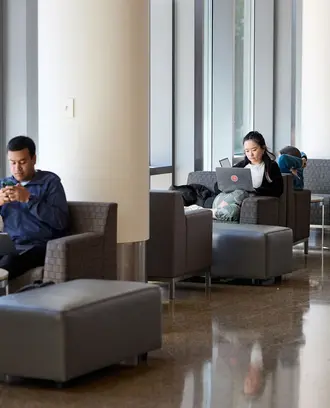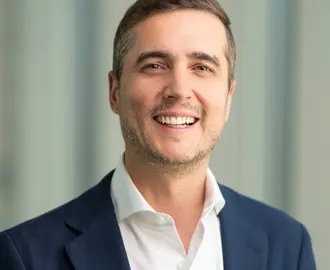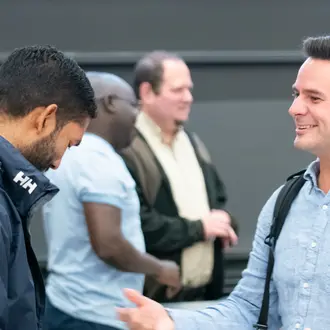How an MIT Sloan Fellows MBA alum became a global leader while remembering his roots
Anderson da Silva Pereira, SFMBA ’23, is a fintech innovator and entrepreneur who spent several years in the banking industry prior to joining the MIT Sloan Fellows MBA. Anderson is now launching a venture to help the millions of small and medium enterprises (SME) in Brazil make smart choices on financing—and seamlessly shift their businesses to the green economy.
Anderson advanced his startup idea during the development of his SFMBA thesis, working closely with MIT Sloan Professor Roberto Rigobon. He recently shared the concept at the MBA Summit in Silicon Valley and at the global SME Finance Forum in Mumbai.
Tell us about the project you’ve been working on with Roberto Rigobon. It’s a very personal one, isn’t it?
Anderson da Silva Pereira, SFMBA ’23
I’m the son of a small entrepreneur in Brazil who started working in the sustainability industry 40 years ago when the word entrepreneur wasn’t even crafted. My father owns a junkyard. He humbly began selling aluminum cans, scrap metal, and industrial waste to a recycling network that adeptly repurposed these materials for use in other supply chains. He left school at an early age and built the business with no formal education. Like many small business owners, he mixed his business and personal finances, so we all felt the upswings and downswings of his enterprise—a hair-raising rollercoaster at times. Basically, the family did well when the company did well but faced several hardships when the company underperformed. I lived the challenges of a small-business entrepreneur every day of my childhood.
My father is not alone. He is one of 42 million entrepreneurs in Brazil who manage their businesses by themselves. Like many of them, he is great at what he does, but when it comes to numbers, interest rates, and relationships with banks, he was in over his head.
When I was in my late teens, he needed a loan to make an investment in the company, so I went to the banks and compared their offerings and figured out which he should accept. Despite my background in tourism, I found myself assisting not just him but his friends, too—other entrepreneurs who needed help. Consequently, in my early 20s, I became a partner in a startup dedicated to helping SMEs identify the most suitable working capital loans. The fact is, we’re talking about more than five trillion dollars in unmet SME finance demand all over the world—and in Brazil, less than 10 percent of small and medium business owners are well served in credit matters. I wanted to change that.
Unlike my father, I went to college. I became an entrepreneur. I worked in banking. And although I had a very varied career path, I always had a mission in the back of my mind to create a business that would serve small business owners like my father and help them prosper. Furthermore, SMEs are pivotal in the shift towards a green economy and providing them with robust support during this transition is crucial. When I arrived at the MIT Sloan Fellows MBA , I wanted to leverage as many resources as I could to advance this concept into a startup. I worked with Professor Rigobon on my thesis about SME lending, which helped me to dig in deep, fully understand the roots of the problem, and develop my solution.
What brought you to the MIT SFMBA? Did you choose from several programs?
Well, I am Brazilian, and as you know, Brazilians love soccer. Not to be immodest, but in Brazil, we have the best players in the game. Often, they go to Europe and play in the most competitive leagues with elite players from all over the world, but in the end, they always come back. I resonate with that sentiment. I want to be a global player, one of the best in my field. I want to play in the “Champions League” of my industry. But I will always head back to Brazil in the end to give back to my country.
With that goal in mind, I chose the Sloan Fellows MBA because I wanted to be trained as a global leader in all the most essential competencies—leadership, ethics, seeing big problems and knowing how to solve them with humility. I wanted a bigger picture. To be the best at what I’m trying to do, I have to understand global economies, global perspectives, and global disruptions in the market. In the SFMBA, there’s so much interconnectedness, the barriers between countries fall away. Although I had a good job and a good career, I wanted to zoom out and get an understanding of the next disruptions. MIT has Nobel Prize-winning professors; some are entrepreneurs who successfully buy and sell companies. I wanted access to people with that kind of experience. That’s why I only applied to this program. I was not interested in any kind of plan B.
How did you approach your year at MIT?
It was an approach driven by curiosity and a bold vision. I wanted to transform into the individual my younger self had always dreamed of. To achieve this, I exposed myself to the most diverse set of possible experiences, ventured into activities beyond my comfort zone, and aimed to gain new perspectives on what’s happening in the world while not forgetting to have fun during the journey.
In the summer, I was determined to explore as many opportunities as possible. I joined clubs, participated in all kinds of experiences, talked with everybody and anybody, went to lectures on unexpected topics—engineering, philosophy, history of the world, even astropreneurship, where we debated venture opportunities in the space industry. When the fall term started, I reined in my focus and concentrated on my objectives: to develop my analytical skills, learn about the major trends in sustainable SME finance, and get the resources necessary to create a business idea. I wanted to explore the ramifications and possibilities of using data and ground-breaking technologies like AI and machine learning to create market disruptions. I took classes that would help me build a sustainable business and became a Legatum Fellow—a fellowship at MIT focused on supporting innovative entrepreneurs in emerging markets. And being at MIT during the ChatGPT explosion was incredibly exciting. By the spring semester, I had developed my idea for the startup and was able to focus my time on making it real.
Talk a little about your peers in the program. What was the cohort experience like?
Every Fellow will tell you that one of the best aspects of the program is the cohort. MIT puts a lot of effort into creating community, and the SFMBA is a great example. Working closely with people from 40+ countries and many different industries is life changing. One of the things I loved most was the Muddy Talks. Every Friday, Fellows would tell their stories, the key lessons they learned over the course of their lives and why they think what they think. It’s mind-blowing and makes you see just how much thought the Admissions Office puts into selecting this group of high achievers.
Did the immersive one-year format work for you?
The principal plus and minus are the same: the year goes by so fast. It’s one super-intense period dedicated to getting everything you need. The format was such a wonderful change for me. Instead of working from 8:00 a.m. to 8:00 p.m. on the corporate treadmill, my focus was to learn, meet people, and explore. Even though I had a lot on my plate as a Fellow, I felt so free. I realized that this was the lifestyle I wanted for the rest of my life. No more treadmills. I had become so used to the grind, but when I stepped back, I said to myself: ‘No, I don’t want that.’
So, yes, for anyone considering this program, I would urge them to do it. You need that one year away from work to change the way you think about your professional life—your whole life, really. The Sloan Fellows MBA was as far as possible from my comfort zone. I even signed up for a half marathon—twice—with a few other classmates, who were also new to running. Basically, I took that year to challenge myself on a professional, personal, physical, emotional, and intellectual level. It was the year I stopped being who I was and became the person I had always wanted to be.
What has been your most memorable MIT experience?
Well, I can think of two—one professional, one personal. The opportunity to study with Roberto Rigobon and get to the bottom of what I believe is a huge problem in our society has been pivotal to my future. SME enterprises employ the vast bulk of the workforce in many countries and are key to distributing prosperity across a wider swath of the population. One important resource to help them grow is access to finance. By channeling this finance to aid SMEs in their transition to a green economy, we achieve a dual victory: ensuring equitable income distribution and securing a promising future for all of us.
I came to realize during this past year that there are so many opportunities in this space, especially when you add the digital transformation the world has seen. I found at MIT a whole new world of infinite possibilities to solve this huge problem in our society. Working with Professor Rigobon, who is an expert on Latin America, I was able to define the problem that I want to solve and come up with a solution. I believe I can make the world a little better, and that’s what I was looking to do—to have impact.
On a personal level, one of my greatest joys was bringing my family to the graduation ceremony. My parents had limited access to education, but they were able to sit in the Great Court at MIT and see their son graduate from one of the best institutions in the world. That was the best day of my life.



